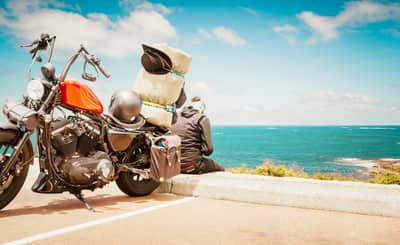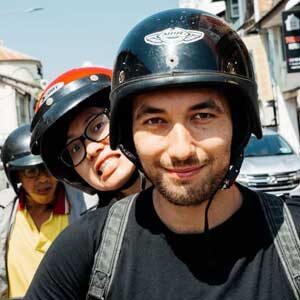One of the reasons I started this website is to share my experience with planning and venturing out on my dream motorcycle trip; a 6 month solo tour of the US and parts of Canada. In planning this trip I find that I am forced to confront barriers that may get in my way, one of them being fear. The shorter motorcycle camping trips I’ve taken in the past have allowed me to work on overcoming much of my fear of traveling and camping alone, but I know there are more concerns with being alone on my motorcycle for months at a time.
So, how do we overcome our fears of solo motorcycle travel? The best way to get over your fear is to face it and do the thing you’re afraid of doing. Start with small steps and slowly expose yourself to the activity until you become familiar with the things that caused you fear and learn techniques for dealing with unfounded fear and anxiety.
Fear is “an unpleasant emotion caused by the belief that someone or something is dangerous, likely to cause pain, or a threat.”
Did you catch that? The belief. You can experience fear even if there is no danger or threat at all. If this is the case, why do we let fear get in the way of allowing us to experience life to the fullest? When on a long motorcycle trip there are a number of fears that may prevent someone from enjoying it. And it’s not just about the fear of camping alone. It can also be the fear of riding a motorcycle alone, staying in a hotel alone, especially for women. It could be the fear of a breakdown in the middle of nowhere or the fear of encountering unfriendly, dangerous people or wildlife.
For this article I tried to think of all the things I am afraid of regarding this trip, and find ways that I can deal with them and conquer them. Also, even though everything in this article applies to both men and women, I am going to address some of it from a woman’s point of view.
Is Fear Natural?
Fear occurs at different levels and in many different forms. The level of fear one person feels is directly related to the experiences they’ve had during their lifetime. Kids who have been bitten by a dog may have a fear of all dogs for the rest of their lives. On the most basic level, fear is a primitive emotion necessary for our survival. That primal fear that has been ingrained in our brains since the dawn of mankind is the emotion that causes us to spring into action when faced with a threat. It helps us make split second decisions to fight, flight or freeze.
When we are being attacked, either by another human, an animal, or a force of nature such as fire, flood or earthquake, our survival instincts, driven by fear, will aid us in taking drastic action to remove ourselves from a dangerous situation. This is when fear is helpful and necessary. This is when fear is natural and justified. And this kind of fear doesn’t require a massive disaster to occur. It can be something small. Have you ever had a dog chase after you while riding a bicycle? Your fear of getting bitten kicks in and you get a burst of adrenaline so you can pedal faster and get away.
But in reality the majority of people who live in a normal, first world society will rarely, if ever, have to experience that serious fight-or-die type of fear. In fact, much of the fear and anxiety we feel comes from our own minds and that is the fear we need to conquer if we want to enjoy traveling alone and camping alone.
Mind Games
As you sit in your tent in the woods at night, or in the middle of the desert, all by yourself, your mind can really mess you up if you let it. In this world of TV, horror movies and urban legends, we have a tendency to jump to the worst conclusion whenever we hear a noise in the night. Thoughts of zombies, serial killers and huge angry bears fill our heads when in all honesty, it’s probably just a chipmunk.
The fears inside our heads don’t match up with what’s happening in real life. And if you dwell on those thoughts, you’ll only become more and more afraid and anxious with every night-time noise outside your tent. It will be a long, sleepless night. And for no reason at all. But, to be honest, it’s perfectly normal for your mind to have fearful thoughts in unfamiliar situations. The trick is to learn how to deal with those thoughts and overcome those unrealistic fears.
There are a number of mind games that you can play to take control of your thoughts and overcome your fears, especially those initial fears that you’re going to feel the first few times you sleep outdoors.
- Acknowledge your fears and recognize that they are normal.
- Determine exactly what it is you are afraid of. Be specific.
- Question your fears. Remember, fear is the belief that something is harmful.
- Distract yourself with something enjoyable such as an activity or reading to occupy your mind.
- Practice motivating self talk. Tell yourself that there is nothing out there that wants to hurt you. Because, quite honestly, that’s the truth.
Overcome Fears by Starting Small
One of the best ways to overcome your fear is to start exposing yourself to the activity that’s causing the fear. You don’t have to jump in with both feet right away. Start small and work your way up. Let’s assume you’re starting from the beginning. Maybe you already have some group riding experience and some experience with overnight trips in hotels and maybe a night in a campground, but you’ve never done anything alone. Where do you start?
Each time you expose yourself to a situation that scares you, take notice of how you react to that fear. Notice your heartbeat and breathing patterns. Take note of what’s happening in your mind and pay attention to how you are talking to yourself. What is your mind saying? Are those thoughts taking your fears to an unnecessary level? Are they making the situation worse? Once you get to know how your mind reacts to the initial fears that you encounter when exposing yourself to new situations, you can then take steps to change your thought process.
Ride By Yourself
Start by getting some experience riding your motorcycle alone. Go on a few long rides, at least a few hours by yourself. Stay in populated areas at first, then gradually venture off onto more remote routes and less populated roads. Take a ride through some heavily forested areas to get used to the towering trees, strange shadows and winding turns. Ride out on some long, straight deserted roads to get used to the feeling of the vast, open desert. When I started going on day rides alone rather than in a group, I found myself enjoying it so much more. You can go anywhere you want. You can stop any time you want and you don’t have to wait on the rest of the group when you’re ready for kickstands up.
Riding by yourself will also force you to find your own way which will force you to overcome your fear of getting lost. You won’t have a group leader planning the route or telling you which way to go. You will have to figure it out on your own. Take a few rides in different types of places like busy cities, small country towns, mountain roads. Practice using your GPS or a paper map on these small trips. If you find yourself in a situation where you think you might be lost, practice staying calm and making rational decisions based on knowledge and facts, rather than based on the emotion of fear. I live by the philosophy of you never get lost. You just make unplanned detours.
Take an Overnight Motorcycle Trip By Yourself
Take a trip farther away from home and spend the night in a hotel alone. This will get you accustomed to entertaining yourself without having friends and family around. It’s a great time to relax and recharge especially if you are somewhat introverted, or a mom who never gets a second alone (ahhhh). You can extend this short solo trip to include 2 nights in different locations giving you even more opportunities to experience traveling alone, interacting with strangers at restaurants and gas stations, and learning who to talk to and who to avoid. When you’re a woman traveling alone on a motorcycle, you’re going to get a lot of attention. Most of it will be friendly and encouraging as people are often in awe of your bravery. But occasionally you’ll run into that one creep who just wants to hit on you. Short solo trips will get you used to dealing with all sorts of people and sharpen your intuitions and people reading skills.
Go Car Camping by Yourself
If you’ve never been camping in your life, find some friends who camp and go with them a few times to learn the basics about camping, building a fire, cooking and sleeping outdoors, etc. But if you’re an experienced camper, start by leaving the motorcycle at home and doing a few solo camping trips in your car, close to home, and in a populated campground. This will get you used to sleeping outdoors and dealing with the sounds of nature and the darkness without having to be completely alone.
Your first solo camping trip will also allow you the opportunity to practice setting up and taking down your equipment. You’ll learn to cook your meals outdoors and, most importantly, you’ll learn how to keep a clean camp and store your food properly. I recommend that you cook using the stove and cook wear that you will be taking on your motorcycle. Leave the iron skillet and big camp stove at home.
It’s very important at this step to practice keeping your campsite clean, throwing away your trash each night, avoid eating or keeping food or scented items in your tent, and store your food in food lockers, bear lockers, or hung up depending on where you’re camping. Don’t leave food in your car because when you’re motorcycle camping, you won’t have the luxury of a car to stash your food in. Start these habits early and you’ll be less fearful of an animal encounter.
Here are a few things you can do on your first solo camping trip that will help you keep from losing sleep due to unfounded fears.
- Avoid reading scary stories or watching scary shows before or during your trip. Don’t read true crime stories or “Bear Attacks of the Century”. Yes, it’s a real book.
- Stay busy. Keep yourself occupied with a chore or an activity to keep yourself entertained.
- Some people like to sleep with ear plugs to dampen some of the smaller night time noises like rustling in bushes. Those little noises are what seem to cause a lot of the unnecessary fears we have.
- If you don’t care for ear plugs, listen to the sounds you hear and try to identify them. Once you know what’s making the sound, you won’t be afraid of it.
- Meditate, pray or use other relaxation techniques to calm your nerves such as deep breathing exercises. Relax and prepare yourself for sleeping. Repeat this step if you’re awakened by noises during the night.
There is one more thing that you will likely encounter when you’re camping that can really freak some people out. If you hear normal animal noises outside your tent, don’t be afraid to investigate the sound. Get your flashlight and see what’s out there. When you do this, you’re likely to see two glowing eyes staring back at you. It can look a little creepy, but it’s nothing to worry about. If you’ve done your research you should already know what animals are common in the area. Those eyes likely belong to a raccoon, skunk or deer. Raccoons and skunks are nocturnal and they will all come out to find food as soon as the sun goes down. Let out a shout, tell them to get lost, they will take off and you can relax.
Go Camping One Night with your Motorcycle
Once you have a little bit of experience camping on your own, now it’s time to take the motorcycle. This time, venture out to a more remote and less populated campground. Try camping in an area where you know there will be more dangerous wildlife, such as bear country. This will also give you the opportunity to practice safety skills such as hanging your food if there are no bear lockers, keeping your campsite clear of scraps and trash. This time you won’t have your car to hide in if you’re scared. So, it will take you a little farther into your fear zone giving you a chance to practice good mental skills to overcome those fears. Extend these trips into two nights, or three. You’ll soon find yourself enjoying the outdoors more and more and letting go of the fears of being outdoors that used to keep you awake at night.
What’s Making That Noise?
One way to overcome fear is to become familiar with the noises you’ll hear at night.In this kind of situation we start to encounter unfamiliar noises or we don’t have the usual ambient sounds that lull us to sleep each night when we are home. Familiar noises like traffic, the neighbor’s dog barking or a distant train; these are noises we’ve come accustom to and they don’t cause us alarm. But when camping you’re going to hear a lot of squeaks, chirps, footsteps, rustling in the bushes, noise in the trees and sometimes it will be in your campsite. You can stay awake in your tent all night constantly saying “What was that?!” or you can become familiar and comfortable with those sounds.
My tip for camping alone is to study up on the animals that are common in the area where you will be camping. You can learn the typical sounds that those animals make so that when you hear them in the wilderness, you’ll be able to identify the animal and decide if you really need to be anxious about it or not. In fall of 2018 I was tent camping on California’s central coast. I was lulled to sleep by the gentle sound of ocean waves in the background and an occasional screech of owls in the trees. But at about 2:00 AM, I heard the most hideous grunting and growling from what seemed to be right outside my tent.
The sound traveled as this thing walked past and into the bushes and I could tell there was more than one of them. I already knew there was nothing in the area that could hurt me and as they walked away the sound slowly disappeared, but I had never heard such a disturbing sound before. When I got home I did a little research and it turned out to be skunks. Just skunks looking for food. But, even though I was not familiar with the growling sounds, they didn’t scare me because I already knew what animals were in the area and I knew that none of them would bother me or hurt me as long as I kept a clean camp and my food put away. Now I know what a growling skunk sounds like.
Overcome Your Fear of People
A lot of solo travelers, solo campers and wilderness enthusiasts will often say that the thing they fear most is other people. Like any fear, this is a legitimate concern and there are certainly people who don’t have your best interest in mind. Overcoming this fear takes a basic trust in humankind. Travelers will tell you that the majority of people they encounter are good natured, kind, are interested in your journey and are willing to lend a helping hand if and when you need it.
I’ve been on numerous solo trips and I have always met friendly people who often invite me for a cup of coffee or to join their group at camp for a beer. As a woman on a motorcycle, people seem to be more impressed with my courage and bravery to travel alone and it usually ends up in a good conversation. Back when I owned a vintage motorcycle, my 1984 Yamaha FJ1100, I got so much attention from men…wait, I mean, my motorcycle got the attention. I met a lot of gentlemen who either owned that bike or knew someone who owned it and I really enjoyed talking about the motorcycle. Again, I met some really nice people. As for those people who are not so nice; here’s where you really need to trust your intuition and use your instincts. Practice common sense safety. Stranger danger isn’t just for our kids.
Another tip for getting over your fear of strangers is to carry something that provides you with protection against an attacker. Whether it be pepper spray, a knife, a fire arm or your teddy bear, this is a personal choice. Often simply having some type of protection laying close by as you sleep, will help settle your fears.
Practice Good Safety
There are other things you can do that will help you with how much fear you might have when you travel and especially when you stop for the nigh, which seems to be the time when people are scared the most. Practicing good safety habits is one of those things. In the outdoors, practice keeping your campsite clean to avoid attracting animals that are looking for food. If animals come snooping around, but you know you stored your food properly, your fears will be lessened and you can relax more knowing that they won’t find what they’re looking for.
Make sure you arrive at your campsite before sundown. This will give you time to get familiar with your surroundings and determine if there are any special precautions you should take to be safe. I once asked a camp host if I could switch sites simply because my neighbors were a group of rowdy, beer drinking guys. When I told her I was traveling alone, she didn’t give it a second thought and assigned me a new site. She was even nice enough to deliver some campfire wood to me. Letting her know that I was alone, and feeling her empathy, told me that she and her husband would be keeping a watchful eye out for me and that gave me some peace of mind.
If you’re staying in a hotel, practice common sense safety habits. Park your motorcycle in a safe place and lock it to avoid theft. Bring all your valuables in with you. Lock your hotel doors and windows. Doing these simple things will give you more peace of mind and reduce or even eliminate your fears of traveling alone.
Reacting to Fear
No matter where your trip takes you, to the wilderness or to a big city, there’s really no way to completely avoid a fearful moment or a tense or anxious situation. So, when it happens, it’s important to not let your fear get the best of you so you can make intelligent decisions to get out of a dangerous or fearful situation. Hearing scary noises in the middle of the night that you know are a valid reason for concern will get your adrenaline pumping and that fear will make it more difficult to make rational decisions. Your first instinct when encountering a bear is to run. What’s the last thing you’re supposed to do when encountering a bear? Run. This is the perfect example of why you need to control your fears so you can make the right decision.
If you find yourself in a tense situation, such as getting lost or hearing a bear in your campsite, take a moment to breath and assess the situation. Take a break from riding if you’re lost, calm your nerves and take some time figure out where you are and where you need to go. You won’t be able to make the right decision if your mind is fogged with panic. The same goes for when you’re in your tent and can hear the huffing of a bear sniffing around your camp. Take a few deep breaths to calm your nerves. Assess the situation and decide what action you need to take. Often, if an animal is passing through your camp, you don’t need to do anything but let it pass.
Wrap Up
I hope the information laid out in this article can help anyone who is new to solo motorcycle travel to overcome their fear of taking the next step. Fear is a natural emotion, but it should not be so paralyzing that you never do things you’ve always wanted to do. Take steps to overcome your initial fears. Learn techniques to reduce your fears and to deal with new fears that you will encounter while on your journey.
Every time you encounter a new fear, especially in a more controlled manner, you will come out stronger. You will build up more strength and courage with each experience. Your goal is not to become fearless. Instead, your goal is to not let fear take you over. Get out, take risks and enjoy your adventure.






